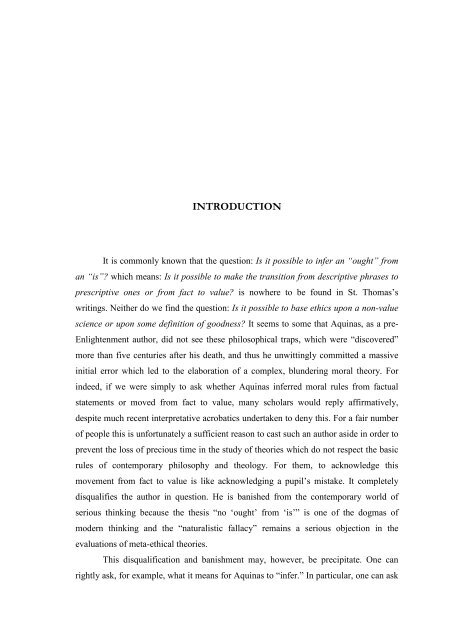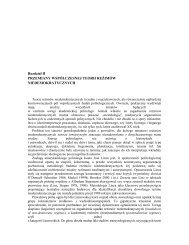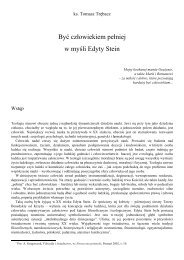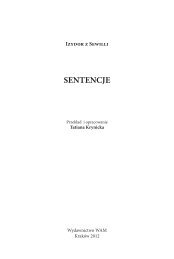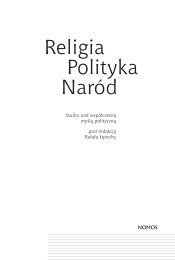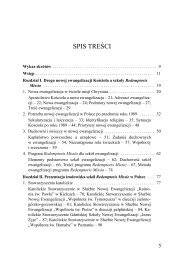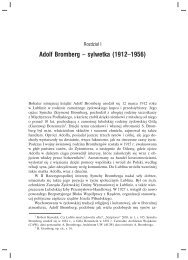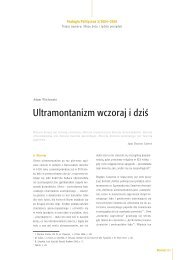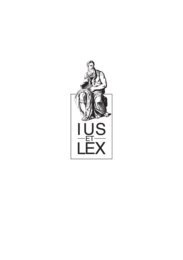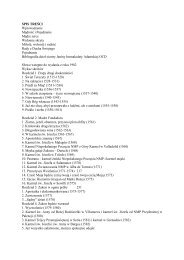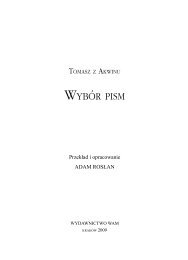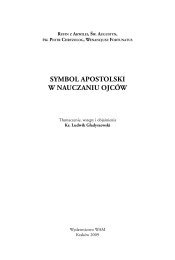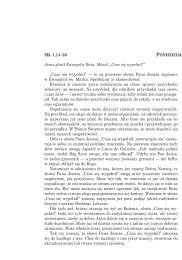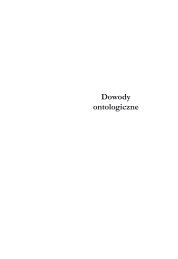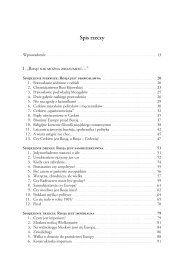- Page 1 and 2: Piotr Lichacz, O.P. DID ST. THOMAS
- Page 3: CONTENTS --------------------------
- Page 7 and 8: 4 Introduction of “man’s last e
- Page 9 and 10: 6 Introduction however, when studyi
- Page 11 and 12: 8 Introduction believers. 16 Perhap
- Page 13 and 14: 10 Introduction In this study I wou
- Page 15 and 16: 12 Introduction provisionally analy
- Page 17 and 18: 14 0. A Short History of the Proble
- Page 19 and 20: 16 0. A Short History of the Proble
- Page 21 and 22: 18 0. A Short History of the Proble
- Page 23 and 24: 20 0. A Short History of the Proble
- Page 25 and 26: 22 0. A Short History of the Proble
- Page 27 and 28: 24 0. A Short History of the Proble
- Page 29 and 30: 26 0. A Short History of the Proble
- Page 31 and 32: 28 0. A Short History of the Proble
- Page 34 and 35: PART ONE --------------------------
- Page 36 and 37: 32 1. Aquinas’s General Approach
- Page 38 and 39: 34 1. Aquinas’s General Approach
- Page 40 and 41: 36 1. Aquinas’s General Approach
- Page 42 and 43: 38 1. Aquinas’s General Approach
- Page 44 and 45: 40 1. Aquinas’s General Approach
- Page 46 and 47: 42 1. Aquinas’s General Approach
- Page 48 and 49: 44 1. Aquinas’s General Approach
- Page 50 and 51: 46 1. Aquinas’s General Approach
- Page 52 and 53: 48 1. Aquinas’s General Approach
- Page 54 and 55:
50 1. Aquinas’s General Approach
- Page 56 and 57:
52 1. Aquinas’s General Approach
- Page 58 and 59:
54 1. Aquinas’s General Approach
- Page 60 and 61:
56 1. Aquinas’s General Approach
- Page 62 and 63:
58 2. St. Thomas’s Logic First, w
- Page 64 and 65:
60 2. St. Thomas’s Logic appropri
- Page 66 and 67:
62 2. St. Thomas’s Logic for the
- Page 68 and 69:
64 2. St. Thomas’s Logic is used
- Page 70 and 71:
66 2. St. Thomas’s Logic concerns
- Page 72 and 73:
68 2. St. Thomas’s Logic Therefor
- Page 74 and 75:
70 2. St. Thomas’s Logic “Aquin
- Page 76 and 77:
72 2. St. Thomas’s Logic Let us t
- Page 78 and 79:
74 2. St. Thomas’s Logic can say
- Page 80 and 81:
76 2. St. Thomas’s Logic This is
- Page 82 and 83:
78 2. St. Thomas’s Logic act. “
- Page 84 and 85:
80 2. St. Thomas’s Logic conseque
- Page 86 and 87:
82 2. St. Thomas’s Logic Aristotl
- Page 88 and 89:
84 2. St. Thomas’s Logic Knowing
- Page 90 and 91:
86 3. Theory of Signification and P
- Page 92 and 93:
88 3. Theory of Signification and P
- Page 94 and 95:
90 3. Theory of Signification and P
- Page 96 and 97:
92 3. Theory of Signification and P
- Page 98 and 99:
94 3. Theory of Signification and P
- Page 100 and 101:
96 3. Theory of Signification and P
- Page 102 and 103:
98 3. Theory of Signification and P
- Page 104 and 105:
100 3. Theory of Signification and
- Page 106 and 107:
102 3. Theory of Signification and
- Page 108 and 109:
104 3. Theory of Signification and
- Page 110 and 111:
106 3. Theory of Signification and
- Page 112 and 113:
108 3. Theory of Signification and
- Page 114 and 115:
110 3. Theory of Signification and
- Page 116 and 117:
4. Scientific Methodology or Ways o
- Page 118 and 119:
114 4. Scientific Methodology or Wa
- Page 120 and 121:
116 4. Scientific Methodology or Wa
- Page 122 and 123:
118 4. Scientific Methodology or Wa
- Page 124 and 125:
120 4. Scientific Methodology or Wa
- Page 126 and 127:
122 4. Scientific Methodology or Wa
- Page 128 and 129:
124 4. Scientific Methodology or Wa
- Page 130 and 131:
126 4. Scientific Methodology or Wa
- Page 132 and 133:
128 4. Scientific Methodology or Wa
- Page 134 and 135:
130 4. Scientific Methodology or Wa
- Page 136 and 137:
132 4. Scientific Methodology or Wa
- Page 138 and 139:
134 4. Scientific Methodology or Wa
- Page 140 and 141:
136 4. Scientific Methodology or Wa
- Page 142 and 143:
* * * 138 4. Scientific Methodology
- Page 144 and 145:
140 4. Scientific Methodology or Wa
- Page 146 and 147:
142 4. Scientific Methodology or Wa
- Page 148 and 149:
5. The Division of Theoretical Scie
- Page 150 and 151:
146 5. The Division of Theoretical
- Page 152 and 153:
148 5. The Division of Theoretical
- Page 154 and 155:
150 5. The Division of Theoretical
- Page 156 and 157:
152 5. The Division of Theoretical
- Page 158 and 159:
154 5. The Division of Theoretical
- Page 160 and 161:
156 5. The Division of Theoretical
- Page 162 and 163:
158 5. The Division of Theoretical
- Page 164 and 165:
160 5. The Division of Theoretical
- Page 166 and 167:
162 5. The Division of Theoretical
- Page 168 and 169:
164 5. The Division of Theoretical
- Page 170 and 171:
166 5. The Division of Theoretical
- Page 172 and 173:
168 5. The Division of Theoretical
- Page 174 and 175:
170 5. The Division of Theoretical
- Page 176 and 177:
172 5. The Division of Theoretical
- Page 178 and 179:
174 6. Explanation in Natural Scien
- Page 180 and 181:
176 6. Explanation in Natural Scien
- Page 182 and 183:
178 6. Explanation in Natural Scien
- Page 184 and 185:
180 6. Explanation in Natural Scien
- Page 186 and 187:
182 6. Explanation in Natural Scien
- Page 188 and 189:
184 6. Explanation in Natural Scien
- Page 190 and 191:
186 6. Explanation in Natural Scien
- Page 192 and 193:
188 6. Explanation in Natural Scien
- Page 194 and 195:
190 6. Explanation in Natural Scien
- Page 196 and 197:
192 6. Explanation in Natural Scien
- Page 198 and 199:
194 6. Explanation in Natural Scien
- Page 200 and 201:
196 6. Explanation in Natural Scien
- Page 202 and 203:
198 6. Explanation in Natural Scien
- Page 204 and 205:
200 6. Explanation in Natural Scien
- Page 206 and 207:
202 6. Explanation in Natural Scien
- Page 208 and 209:
204 7. Some Lessons from Natural Sc
- Page 210 and 211:
206 7. Some Lessons from Natural Sc
- Page 212 and 213:
208 7. Some Lessons from Natural Sc
- Page 214 and 215:
210 7. Some Lessons from Natural Sc
- Page 216 and 217:
212 7. Some Lessons from Natural Sc
- Page 218 and 219:
214 7. Some Lessons from Natural Sc
- Page 220 and 221:
216 7. Some Lessons from Natural Sc
- Page 222 and 223:
218 7. Some Lessons from Natural Sc
- Page 224 and 225:
220 7. Some Lessons from Natural Sc
- Page 226 and 227:
222 7. Some Lessons from Natural Sc
- Page 228 and 229:
224 7. Some Lessons from Natural Sc
- Page 230 and 231:
226 7. Some Lessons from Natural Sc
- Page 232 and 233:
7.3. Cogitative power (vis cogitati
- Page 234 and 235:
230 7. Some Lessons from Natural Sc
- Page 236 and 237:
232 7. Some Lessons from Natural Sc
- Page 238 and 239:
234 7. Some Lessons from Natural Sc
- Page 240 and 241:
236 7. Some Lessons from Natural Sc
- Page 242 and 243:
238 7. Some Lessons from Natural Sc
- Page 244 and 245:
240 7. Some Lessons from Natural Sc
- Page 246 and 247:
242 8. The Analyzability of Goodnes
- Page 248 and 249:
244 8. The Analyzability of Goodnes
- Page 250 and 251:
246 8. The Analyzability of Goodnes
- Page 252 and 253:
248 8. The Analyzability of Goodnes
- Page 254 and 255:
250 8. The Analyzability of Goodnes
- Page 256 and 257:
252 8. The Analyzability of Goodnes
- Page 258 and 259:
254 8. The Analyzability of Goodnes
- Page 260 and 261:
256 8. The Analyzability of Goodnes
- Page 262 and 263:
258 8. The Analyzability of Goodnes
- Page 264 and 265:
260 8. The Analyzability of Goodnes
- Page 266 and 267:
262 8. The Analyzability of Goodnes
- Page 268 and 269:
CONCLUSIONS The aim of this dissert
- Page 270 and 271:
266 Conclusions common to diverse d
- Page 272 and 273:
268 Conclusions really are. Imperat
- Page 274 and 275:
270 Conclusions In Chapter 6 we exp
- Page 276 and 277:
272 Conclusions We offered only som
- Page 278 and 279:
274 Conclusions is claimed to be go
- Page 280 and 281:
BIBLIOGRAPHY Works of Thomas Aquina
- Page 282 and 283:
278 Bibliography Anscombe, G. E. M.
- Page 284 and 285:
280 Bibliography Engelmann, Edward.
- Page 286 and 287:
Kenny, Anthony. Aquinas on Mind. Ne
- Page 288 and 289:
284 Bibliography -----. “Beyond t
- Page 290 and 291:
286 Bibliography Sweeney, Eileen C.
- Page 292:
ABBREVIATIONS EPM - David Hume, Enq


